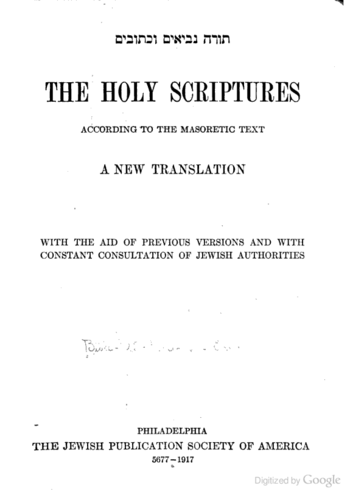Today’s guest post is by Randy Brown, creator of BibleBuyingGuide.com. Randy reviews Bibles in all price ranges to help people make the best choice for their budget. His mission is to promote Bible reading and study, and to share quality publishing.

Shot of a bible with a very small depth of field. Not quite focusing on the extremely fine Bible paper used, but it should help get the point across. (Photo credit: Wikipedia)
I’ve never been one to just pick a Bible at random. A Bible has to suit a specific purpose. It has to meet certain needs.
You don’t just pick any bowling ball, bat, glove, club, bow, shoe, tire, car wax, gasoline, car, house, suit, television, DVD player, or computer when you have a specific job to do. You choose them for your specific need or purpose.
A Bible is no different. Sure, you can preach from any Bible you can get your hands on. But that doesn’t mean there isn’t a better choice for your purpose—one that will make you a more effective preacher.
Answering practical questions can help you determine what kind of Bible to use:
Do you need something you can read from while it lays on the pulpit?
Do you want to hold it and walk around?
Do you need to hold it in one hand while you hold a microphone in the other?
Do you need room for notes?
Do you need a modern translation?
Do you need clear section headings?
Do you need alternate translations?
Do you need a verse-by-verse format?
Do you need your sermons outlined beside the text?
Do you need large print?
Every preacher I know will answer those questions differently—because we all have different needs. The best Bible for me won’t necessarily be the best Bible for you. With the amazing number of choices we have today, how do we decide?
What you don’t need
While preachers do need tools for study and sermon prep, they don’t necessarily need those tools in the Bible they preach from. Some of these features get in the way of the text. They can make the text small and the Bible large. You have enough to worry about when you’re preaching. Don’t add to that worry with a Bible that’s awkwardly large or text that’s awkwardly small.
Just because a Bible has amazing features doesn’t mean it’s a good Bible to preach from.

Why you need multiple Bibles
Not every Bible does everything equally well. It’s why you own more than one pair of shoes. The shoes you wear to funerals aren’t the same shoes you wear for running and hiking.
I recommend having different Bibles for different purposes. It’s possible to use just one Bible for everything, but you’ve heard the saying: “Jack of all trades and master of none.”
What you want inside
You have to decide how much and what kind of information you need in your Bible.
Do you want complete sermon outlines?
Do you want chain references?
Do you just want the text?
Do you want someone else’s commentary?
Do you need book introductions?
Regardless of what tools a Bible contains, the most important thing is the text. You will have to decide what else you need. Remember—this is a Bible for preaching, not for biblical scholarship.
Where you put it
Consider how and where the Bible will be used. Do you preach in more than one location?
Pulpit

A Bible next to the pulpit of Orchard Road Presbyterian Church in . (Photo credit: Wikipedia)
Pulpits come in all sizes and angles. Some will have room for a large Bible and a notebook and others only have enough room for a small Bible. Some churches use music stands for pulpits. Laying the Bible on the pulpit keeps your hands free. This is more important if you’re holding a microphone.
Larger print makes it easier to see from a distance. Some like to use larger print so they can see it from a few feet away.
A disadvantage to not carrying it around with you as you move around the room is you have to go back to the pulpit to read.
Hand
Holding your Bible when reading has the advantage of moving around without having to go back to the pulpit to read. A disadvantage is that you have to go back to the pulpit to read your notes if they’re not in your Bible.
To preach with a Bible in hand, the Bible needs to be easy to handle.
How you preach
How do you prefer to organize your notes? Do you tuck them in your Bible, a notebook, or a separate page?
If you’re preaching without a notebook or separate outline, you’ll want room for notes. If you use a notebook, you should consider how you’ll handle it during your sermon. If you preach from a page, the page can lay next to your Bible or even be a loose sheet that you move from page to page.
Getting the right size
The ideal Bible is compact enough to handle and large enough to read. It might even have some room to write notes. In my experience, most people prefer ultrathin large print or personal size large print.
Larger Bibles either have more information in them or larger print. If the Bible is only used on a large pulpit, then you won’t have to worry about the size of the Bible. However, large pages can be awkward to turn.
If you carry your Bible around to read from, then a large Bible will get heavy after a while. It might not feel heavy to you when you first pick it up—after all, it’s only four pounds. But after about 20 minutes of holding a four-pound Bible, your mind might not be on your message.
Small Bibles are great for carrying, but they usually have small text. The more extra content they have, the smaller the text.
Many preachers prefer a personal-sized Bible with large print for preaching. They’re easy to carry and have readable text.
If you’re holding a microphone and a Bible while you’re preaching, it’s essential to have a Bible that is easy to hold in one hand.
Many preachers like to use an 8.5″ x 11″ sheet folded in half for their notes. They want this folded sheet to fit perfectly within the Bible when it’s closed. This means the pages need to be larger than 8.5″ x 5.5″.
Many people I’ve worked with consider the optimum size to be around 9″ x 6″ x 1.5″ for laying on the pulpit and around 8″ x 5″ x 1.5″ for holding in the hand.
Finding your place
A thumb index is helpful for turning to a book quickly. Most thumb indexes have three books per tab. This gets you in the ballpark, but you still have to turn pages until you find the book. Some indexes, such as the one found in the Cambridge Concord, have one book per tab for the most popular books.
An alternative is adding your own tabs. The advantage of tabs is there is one tab per book so you can turn directly to the book you want. A disadvantage to tabs is they can tear the page with use.
Another alternative is marking the edges of the pages or using sticky notes.
Keeping it open
Laying flat is a must for a preaching Bible. It’s frustrating to open to your text just to have your Bible close on you when you move your hand away.
Sewn bindings allow the Bible to lay open and stay open. Some that are edge lined might take some breaking in but they will lay flat at Genesis 1:1.
A Bible that you have to hold open to preach from will work against you and not for you. This can be especially difficult if you’re holding a mic in one hand and the Bible in the other.
One alternative is to lay something across your pages to help hold it open while it lays on the pulpit. I don’t recommend this practice as you will constantly be moving and shifting things around in order to turn pages and this will interrupt your train of thought.
To really be useful it needs to lay flat on its own.
Holding the Bible
Some like to fold their Bible in half so they only have to deal with half the width. Others like to roll it up like a newspaper. This way they can hold it in one hand with relative ease. This is especially helpful when the wind is blowing. Sewn bindings are a must for holding up to this type of abuse.
Layout
The layout is how the text and information is presented on the page. There are two major choices for modern Bibles: paragraph and verse by verse.
Paragraph
Paragraph format sets the text in paragraphs, much like a novel. Poetry is usually set to verse format and sometimes Old Testament quotes are in an offset text. Paragraph format is easier for reading and is great for keeping things in context. However, verse numbers are usually superscript, which can make finding specific verses difficult during a sermon. Some paragraphs are also wider, which can make reading from them a little difficult for those with bifocals.
Verse by verse
With a verse-by-verse layout, each verse begins on a new line. This is easier for finding specific verses quickly. Many preachers prefer to preach from verse-by-verse format as verses in paragraphs might take extra time to find.
Column width

Bible Chouraqui. (Photo credit: Wikipedia)
Text that is presented in two columns usually have narrow columns that are narrower than text presented in a single column. This will affect readability—especially if you wear bifocals. You might have to move your head from side to side to read single-column layouts. Also, if the column is too wide it might be difficult to find which line to read next. This is especially true if you’re reading at an angle.
Section headings
Section headings are short descriptions of the passage that follows, usually covering a paragraph or two. They are great for scanning the pages quickly. They help break up the text into shorter, readable sections. I find this visually appealing as it gives the page more white space.
I’ve added to a sermon on the fly because a section heading caught my eye. I’ve also used them to find something that I kind of knew where it was but I needed a little help finding it as I was scanning the page.
One problem with section headings is that preachers tend to stop at the end of a section. Sometimes you will want to continue on. It’s up to your text and topic to decided, but don’t let section headings do the deciding for you. They can also be distracting and can include theological bias.
Chapter summaries
Rather than having section headings within the text, some Bibles, particularly KJVs, have chapter summaries at the beginning of every chapter. They are essentially the same as section headings, they’re just not placed within the text.
The advantage of chapter summaries over section headings is they don’t break up your text. This helps keep passages together and can help keep them in context. The disadvantage is they can be harder to use because they’re not placed on the page with the text they correlate to. They’re less distracting but can contain the same theological bias.
Running header
Many KJVs, such as the Concord, have page summaries at the top of the page. These can be used to scan the pages quickly. You can even mark them to find the pages and topics with less effort.
Choosing the print
The quality of the print makes a big difference on how easy the text is to see. Is it large or small, faint or bold? We all have different needs for font size and boldness and our needs might change with age.
Boldness
Lighting varies and you will need a font you can see easily. A font that isn’t bold enough will increase eye fatigue. Higher contrast reduces eye strain. Font size for preaching is usually larger than font size for study.
Font size
There are two numbers to be aware of for font size. The first is the size of the font itself and the second is the leading—the size of the font plus the space between the lines of text.
For example, a 10-point font with one point between the lines would have an 11-point leading. It would be described as 10/11. Sometimes only the size of the leading is given.
This is why two Bibles can have the same size font but one is called an 8-point and the other is called a 9-point. They are both 8/9.
Line matching
Text that lines up to the text on the other side of the page improves readability. Thinner paper that has line matching looks better than thicker paper that does not.
Italics
Some Bibles have italics for supplied words. Many preachers like to point out when a word was not in the original text.

Lectern Bibles
Lectern Bibles have giant print and are large. They often span 24” when opened. This might not leave room for a notebook. They usually have great paper and print quality, but they are very expensive—often $300 or more.
Study Bibles
Study Bibles are big, and the notes can be distracting. It can also be annoying trying to find a verse when one page has 30 verses and the next has two. Another problem is having to flip through 10–20 pages of articles to get to the next verse in the chapter.
Find one that fits you
A preaching Bible is specialized. It doesn’t have to have everything you need for study and day-to-day ministry.
Look for the balance between the size of the Bible and the size of the text that works for you.
Your Bible doesn’t have to do everything. It just needs to do one thing and do it well.
* * *
Additional reading:
- Obstacles to effective evangelism
- What English Bible do you use?
- Words to push and pull
- Appointed to be read
- Good or bad preacher
- Writers needed to preach to non-believers
- Some one or something to fear #7 Not afraid for Gods Name
- Depression, Anxiety, Pressure and megachurches
- Being Religious and Spiritual 8 Spiritual, Mystic and not or well religious
- Caricaturing and disapproving sceptics, religious critics and figured out ethics
- Some one or something to fear #3 Cases, folks and outing
- Accuracy, Word-for-Word Translation Preferred by most Bible Readers
- The Most Reliable English Bible
- NWT and what other scholars have to say to its critics
- The Divine name of the Creator
- Use of /Gebruik van Jehovah or/of Yahweh in Bible Translations/Bijbel vertalingen
- Hebrew, Aramaic and Bibletranslation
- Some Restored Name Versions
- Anchor Yale Bible
- The NIV and the Name of God
- New American Bible Revised Edition
- Bible translated into Jamaican Creole Patois
- 2001 Translation an American English Bible
- Bibletranslation in Lingala
- The Metaphorical language of the Bible
- Record breaking preaching in Mount Dora
+++
- The main benefit that is obtained by preaching is (memoirandremains.wordpress.com)
Jonathan Edwards is famous for many things, among them is his statement about the necessity of the heart being moved during the preaching of the word of God:
The main benefit that is obtained by preaching is by impression made upon the mind in the time of it, and not by the effect that arises afterwards by a remembrance of what was delivered….Preaching, in other words, must first of all touch the affections” (Jonathan Edwards, A Life, Marsden), p 282.
- Florida preacher’s sermon breaks Guinness record at 53 hours, 18 minutes (fellowshiproom.org)
Did I hear Richard Mansel say he was going to break this record next week during his regular sermon? 😉
- Suppository preaching (onedaringjew.wordpress.com)
Much preaching today does not attempt to relate the Old Testament to Jesus but to their narcissistic audience: Get rid of the frogs in your life, purge yourself of poverty, find your purpose, live your dream, reach your po-tential. What they don’t do is expository preaching, that is, preach the Bible, verse by verse and connect it to Jesus.
- Preaching should be awe-FULL (wheelsms.wordpress.com)
When a pastor treats the Scriptures as one more academic subject, his sermons will sound dry and boring. When the Bible fails to grip his heart, it will seldom go beyond his listener’s ears, let alone grip their hearts. Such is the theme of pastor Erik Raymond’s insightful post, “The Missing Ingredient in Many Sermons.” He compares preaching to cooking a good meal when he says,Like cooking, preaching can become bland. It can fail to have that freshness worthy of the gospel table. There are many reasons why. One could identify a lack of preparation, lack of understanding, poor delivery, and shallowness. We would not disagree that under-cooking the homiletical meal is a problem. But there is something else that can make preaching bland: the deadly reality of not being personally wowed by the subject.
- What Should I Preach ? (faithinspires.wordpress.com)
One of the most frequent questions I get especially from new minsters is how do they know what to preach. It can seem daunting at first. A new topic every week for the next several decades of their career. First of all nobody can handle a career’s worth of decisions all at once But I wanted to commit some ideas to paper for those who might find themselves stuck for a sermon topic.
- Preaching Big Books (biblicalpreaching.net)
Perhaps you shy away from preaching series from the bigger books in the Bible? Maybe it would help to think differently about big book series. There is more than one way to preach a series from a big book (like a major prophet or Acts):
- Identifying with Bible Characters (biblicalpreaching.net)
The Bible is full of stories. Stories are very effective ways to communicate. When a story begins, people tend to do two things – first, they identify with (or disassociate from) characters, and second, they feel the tension in the story, anticipating the resolution. So when we preach Bible stories, let’s be sure to help listeners connect with what is going on.
- Pastor preaches for 53 hours, claims world record (christiantoday.com)
Pastor Zack Zehnder from The Cross church in Mount Dora preached for 53 hours and 18 minutes, smashing the previous record which was a mere 48 hours and 31 minutes.Zehnder, whose father, grandfather, and great-grandfather were all ministers in the Lutheran Church, undertook the challenge to raise funds for an addiction recovery ministry run by the Hand in Hand charity.
















 whole Bible about the God we worship, Jesus Christ. Seeing all the names, titles and other attributes with which he is labeled in both the Old and New Testaments and contemplating those titles and their meaning to me personally is a wonderful way to worship Him. Worshiping Him is what we are made for. Worshiping Him is what those who know Him will do for all eternity. These Name, Titles and Attributes allow practice in this life.
whole Bible about the God we worship, Jesus Christ. Seeing all the names, titles and other attributes with which he is labeled in both the Old and New Testaments and contemplating those titles and their meaning to me personally is a wonderful way to worship Him. Worshiping Him is what we are made for. Worshiping Him is what those who know Him will do for all eternity. These Name, Titles and Attributes allow practice in this life.















